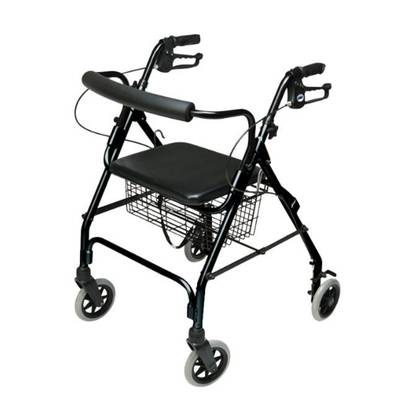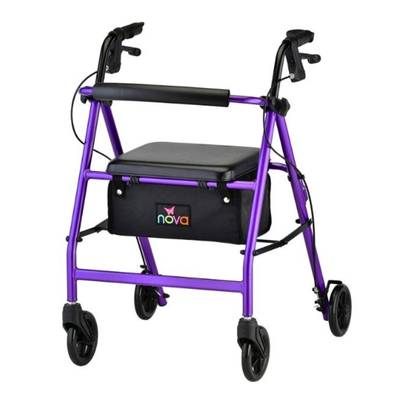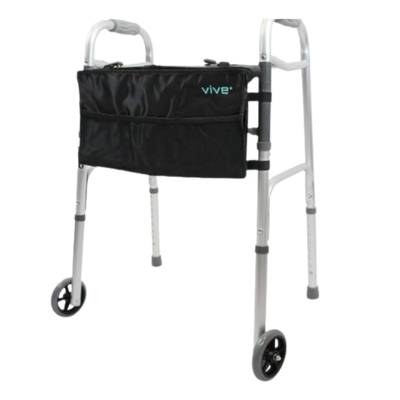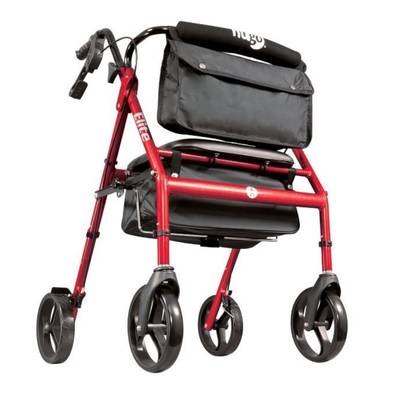Table of Contents
Walker Buying Guide
When you are looking for a walker, it is important that you make an educated buying decision. A good walker can improve your mobility and wellbeing, but there are things to consider to make sure that the walker you purchase is high-quality and suited for your needs.
How Do You Know When You Need a Walker?
While there is no specific time you need a walker, there are some things that you can look for in addition to talking to your doctor. The main reason to get a walker is for mobility, but they can also take pain away from your legs and joints because there will not be as much weight or pressure on the knees.
Typically, when you have a hard time putting your complete body weight on your legs, then you may benefit from using a walker. Even if only one of your legs is sore, weak, or has reduced strength, you may want to consider purchasing a walker at least for using part-time.
Many seniors find that they require a walker following knee or hip surgery. When you are in recovery, the use of a walker for mobility will likely be recommended by a medical professional. It may be best to look at the options or even buy a walker before the operation so that you are prepared for the recovery process.
One more benefit of using a walker is for balance issues. Walkers can prevent falls that could diminish your mobility and health. Moving around easily is important for wellbeing and you never want to regret procrastinating the decision to buy a walker if it is necessary for mobility or to reduce pain.
Why do Seniors Resist Walkers?
Walkers can be effective for mobility and to prevent falls. However, some seniors are hesitant to purchase a walker. There are several reasons that this may be the case.
Some seniors may feel that the use of a walker threatens their identity. This is completely understandable since a senior has already made it through their whole life without the use of a walker to improve mobility. Seniors may also have an issue with the stigma that surrounds the use of a walker.
Other individuals may resist the use of a walker because they feel like they do not need it. Of course not every senior requires a walker, but they can prevent falls and improve the quality of life for many.
Finally, researchers in a 2017 study found that there were lots of seniors who lacked the knowledge that walkers could reduce the chance of falls or even the correct way to use a walker. Education is important to ensure that walkers are provided to the older adults that need them.
Many insurance providers will even pay for all or part of the cost for a walker with a prescription. If you or a loved one has trouble accessing places, getting around, or balance issues, then a walker may be the solution that you have been looking for.
Types of Walkers
A walker can improve the quality of life for a lot of people, but there are several different types. Knowing the type can help you choose a walker that suits your needs and desires.
Standard Walker
Standard walkers are very affordable for those seniors who do not have a prescription or if your insurance will not pay for it. These types have four legs that are wrapped with rubber to provide stability and prevent the legs from slipping. You have to pick this walker up to move.
Since standard walkers do not have wheels, they are the most stable option. Another advantage of a standard walker is the ability to fold it for storage or transportation.This type of walker is recommended for individuals who have to put a substantial amount of weight onto the walker itself. This includes those seniors who are unstable with a cane or cannot adequately control a walker that has wheels.
Two-Wheel Walker
Two-wheel walkers have two wheels on the front and two sliders on the back and are also called rolling walkers. This type of walker is good for individuals who have issues with balance, but do not need to put a significant amount of weight onto the device. Rolling walkers provide a more normal gait and walking pattern than standard walkers because they do not have to be lifted off of the ground with every step.
Additionally, the combination of the front wheels and back sliders makes it much easier to use the walker on different surfaces. Plus, this type of walker easily folds for storage and transportation just the like standard walker.
One downside to two-wheel walkers is that they are slightly less stable than standard walkers. In addition, the front wheels do not rotate which can make it difficult to turn. Because the arc of the turn is so large, many users will opt to pick up the walker during the turn which can increase the risk of a fall.
Four-Wheel Walker
A four-wheel walker is also known as a rollator. These options generally have seats, brakes, and baskets for carrying items like grocery bags or wallets. This is typically the type of walker for individuals that need the device for balance, but do not have to put much, if any, weight on the walker.
Rollators are easy to move forward and to maneuver around turns because they usually have rotating wheels and do not require any lifting to be propelled. The seat is great for those seniors who require occasional rest.
There are disadvantages as with any other type of walker. For one, not applying the brakes can cause the walker to roll away or it can slip during use. This is especially true for inclining or declining surfaces. Finally, this walker is not as good for transportation or storage because are larger than the other types when folded.
Three-Wheel Walker
There are similar walkers to rollators that only have 3 wheels instead of four. These three-wheel walkers provide balance and mobility in a similar way as the four-wheel options, but are lighter and compact for storage or transportation. This is a good option for those who need a walker for balance without having to put their weight on them, like a rollator, but who also need to transport the walker in a smaller vehicle.
Knee Walker
A knee walker is a device that has wheels and a cushion to place your knee on it. These are great for surgery recovery or those seniors that have one bad knee or leg that requires rest. However, this is not a good option for seniors that have balance issues or those who cannot adequately support their weight unless it is because of surgery or injury to only one leg.
Things to Consider When Buying a Walker
There are tons of different walkers of every type available. So how do you know you are getting one that will work for you? There are a lot of things that you should look for when shopping around for the best walker.
Transportability
Walkers are typically fairly lightweight, especially when you compare them to wheelchairs. However, some options are much heavier than others. Lightweight options are recommended for ease of use and transportability.
If you plan on transporting the walker often, it is also important that you get one that can become compact. This will make it easier to carry or to fit into smaller spaces like the trunk of a car. Most walkers are foldable, but some are easier to fold than other options. The ease of foldability is a factor to consider if you ever plan on traveling with the walker.
Size
A walker will work the best if it is the right size for the user. The height of the handlebars is one of the things that you should definitely consider. You should also consider the width of the walker and the height and depth of the seat if the walker has one.
Almost every walker is adjustable, but there they have different height ranges. You need to make sure that you can comfortably reach the handlebars to reduce the tension in your shoulders and back. With your shoulders relaxed, you should place your hands on the grip while your elbows remain bent at an angle around 15 degrees. The top of the handlebars should align with your wrists when your arms are at your sides.
The width of the walker may be important because some options may be too wide to easily move through the doorways in your home. You should double check the width to be sure that it will work well for your home and any other places that you visit regularly.
If you are considering a walker that has a seat, you will want to take the width, depth, and height into consideration. Most walkers have adjustable height on their seats, but you still want to be sure that you can comfortably sit into the seat without having to extend or bend your legs too much.
When you sit, you also want to be comfortable and not squeezed so you should try to get a wide seat as long as it does not widen the walker so much that it would not fit into doorways. Also, you want to be sure that the seat has padding that will be comfortable.
Brakes
Standard walkers do not have a braking system, but the other types will have one. There are different types of brakes. Rollators often have loop brakes that you can use by squeezing a lever. However, this is not necessarily a good option if you suffer from arthritis or other pain or weakness in your hands. Some options have easy to use push-down breaks that can be applied with your foot. This is a great option for those who have issues with hand dexterity, weakness, or pain.
Weight Capacity
All walkers that you look at will have a weight limit that you need to look at before purchasing one. Most are good for 300 pounds or so, but others have higher weight limits up to 500 pounds. This is important to consider depending on your weight and the use of the device.
Grip
Walkers can come with different types of grips. There are plastic grips that are the most common. However, there are also foam grips and grip covers. If you have a difficult time grasping with your fingers, then you may want to get a larger grip surface.
Price
The price is another factor to consider. Walker prices can differ significantly depending on the type, style, and brand. Take the other factors into consideration and find options in that price range that fit your budget. You should not have to spend more than $200 for a quality walker, but there are more expensive options that have additional features.
5 Best Walkers
NOVA Vibe 6 Rollator Walker
NOVA Vibe 6 Rollator Walker
This rollator is affordable, but remains high quality. The braking system works better than other options and it has a comfortable padded seat and storage pouch. The wheels are 6 inches so it can traverse carpet and other surfaces. The weight limit is 300 pounds and comes with a lifetime warranty (5 year warranty for the brakes).
Pros
- Lifetime Limited Warranty
- Easy to use brakes
- 300 pound weight limit
Cons
- Not compact
- Seat may be small for some people
- Wheels do not have much traction
Vive Folding Walker
Vive Folding Walker
This is a great option for those people who want a standard or two-wheel walker but cannot spend too much money. This walker has 2 detachable front wheels which makes it great for use in different situations or locations. This option is also easy to fold and fairly lightweight. The weight limit is 250 pounds and the height can be adjusted between 30 and 33 inches.
Pros
- Easy to fold
- Non-slip hand grips
- Narrow width
Cons
- Wheels may not be good for rough surfaces or thick carpet
- Very little storage space
- May be heavy for some people
Hugo Rollator Walker
Hugo Rollator Walker
The best feature of this walker is the seat. The seat has adjustable height and has thick, comfortable padding. Also, the seat has storage underneath it and a backrest. The handlebars are adjustable and the grips are ergonomic. This walker has a weight limit of 300 pounds and it also has large, 8 inch wheels that are good for mobility on virtually any surface.
Pros
- 8 inch wheels
- Ergonomic Grip
- Comfortable Seat
Cons
- More expensive than other options
- Difficult to fold
- Weak brake system
Graham-Field Lumex Rollator

Graham-Field Lumex Rollator
This is an affordable rollator that has a comfortable seat and adjustable hand grips. It has an easy to use braking system and storage basket. It also has 6 inch wheels and turns easily. There are several color and design options available to suit your style on any budget.
Pros
- Quality Braking System
- Great maneuverability
- Affordable
Cons
- Seat may be too high for shorter seniors
- Not very compact
- Heavy
Medline Premium Empower Rollator
This option has a plethora of unique features. It has a cup holder and an extra wide, and very comfortable, seat. It also has a backrest and the seat can be removed and stored in a bag for transportation. The memory foam seat, handles, and backrest have antimicrobial technology included. The 8 inch wheels are good for virtually any surface.
Pros
- Comfortable seat
- Large height range
- 8 inch wheels
Cons
- Heavy
- Not compact
- Wide body
Recent Articles



















